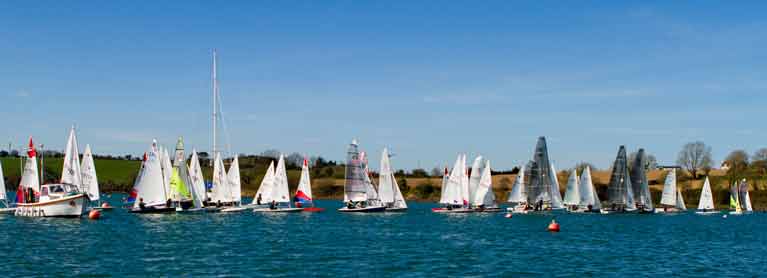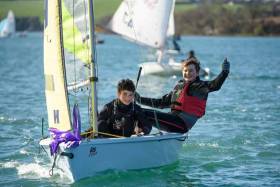Displaying items by tag: Classes
How Can Irish Sailing Keep The ‘F In Fun’?
Could British sailing’s own difficulties with maintaining the ‘fun factor’ to attract more racers and fans have repercussions for the ISA’s recent efforts to rejuvenate the sport in Ireland?
David Henshall writes for Yachts and Yachting about measures that can be taken to ensure the ‘f in fun’ isn’t lost from the British sailing scene.
And his conclusions would surely be just as pertinent on this side of the Irish Sea.
One issue identified is time, or the use of it. The article cites Finn Olympic medallist Luca Devoti as one helm at the pinnacle of the sport who sees that as more racing is compressed into the available time, “the more it favours the elite sailors that increasingly are dominating our sport”.
Indeed, it’s not difficult to see why amateurs might be dissuaded from prepping their boats for any weekend meet where the fleet will be ruled by more aspirational professional or semi-pro sailors on the elite track, for whom the results are all.
What can British clubs do to make inroads? Henshall suggests more midweek and after-work sailing meets — something Irish sailing clubs are already making efforts to do this summer season.
But it’s not just about scheduling, it’s also about creating the conditions for more fun on the water. That means considering what the majority of participants want from their races, not what the principal of peak competition demands.
Sailing weeks — combining on-the-water races on unorthodox courses, eschewing the standard windward/leeward runs, with a shoreline festival atmosphere — are cited as one way to buck the trend and maintain a sense of fun.
Open meets in the junior classes like Oppys and Toppers remain successful in the UK and Ireland alike, and fresh thinking at governing-body level is encouraging a new greater sense of ensuring the fun is in taking part, not just winning and striving climb the ladder of success.
What’s more, classes like the lighting-quick Moth, while bringing a new sense of excitement to sailing for competitor and spectator alike, are also fuelling a revival of their non-foiling classic brothers
The shake-up of the ISA-up of the ISA in recent years has seen a push for one-design classes, where the potential for fun is greater than in handicaps — after all, everyone sailing the same boat levels the playing field and reduces that sense of frustration lower-level sailors must feel when higher performance vessels leave them in their wake.
 Mixed dinghies compete at Royal CorkYacht Club's PY 1000 event in Crosshaven Photo: Bob Bateman
Mixed dinghies compete at Royal CorkYacht Club's PY 1000 event in Crosshaven Photo: Bob Bateman
Things aren’t helped by a proliferation of new designs driven by the high-performance level, writes Henshall, which are “fragmenting the scene” and ultimately mean little to grassroots club sailors — the equivalent of trying to sell sports cars to commuters.
Can there be a balance between fun and performance? Henshall suggests the D-Zero design in Britain as a prime example, where neither is sacrificed for the other. The question is, is there a similar mid-range dinghy class that offers the same in Ireland?
What else can be done in the Irish sailing scene to ensure the ‘f in fun’ isn’t lost? Have your say in the comments below!
Irish Sailing Classes and Associations
Spoiled for Choice
There’s no shortage of one-design classes from which to choose and each gives its enthusiasts great competition, fun and camaraderie, writes Graham Smith in this review of the classes. A profile of each active class in Ireland is supplied below; just click on the title link (in bold) or the Class Association link to go directly to the information.
One-design racing is where it all starts. It is, after all, where all the top sailors earned their stripes, battling away for line honours without a thought for a handicapper’s calculator wiping away a hard-fought victory!
Indeed, you could count on less than one hand the number of top Irish sailors who didn’t cut their teeth in a one-design dinghy! Just think of Cudmore, Barrington, Watson, Wilkins, Hennessy and Dix to name a few and you realise that they honed their skills in everything from Enterprises to Lasers and a lot in between.
At present count, there are a little over 30 one-design classes in Ireland, split almost evenly between dinghies and keelboats, a statistic which might raise a few eyebrows. They range from the long-established Mermaids, IDRA14s and Dragons to the newer additions like Fevas, Topaz and RS Elite. They all fill a particular need and give their owners and crews considerable enjoyment.
Many have attracted their World or European Championships to Irish waters over the years and while 2009 is notable for a lack of such events here, the following year will see the Etchells Worlds at Howth and perhaps a few other international regattas too.
In addition to the review, we asked each class to complete a questionnaire giving details of their fleet numbers, whether they were on a growth pattern or holding their own, so we could highlight those ‘on the up’ and those remaining static in terms of numbers. The older traditional designs, as you might imagine, fall into the latter category, although that’s not a negative!
CLASS REVIEW The State of the Classes – League Table (as at February 2009)
S = Static; U = Up/growing
275 Optimist U
200+ Laser S
189 Mermaid S
160 Flying Fifteen S
130 RS Feva U
115 Shannon One Design U
100+ Mirror S
100+ Topper U
99 Topaz U
94 Laser SB3 U
87 GP14 U
85 Squib S
70 Fireball S
70 Ruffian S
60 J24 S
60 Shipman S
52 Dragon S
50 RS400/200 S
50 420 U
43 Multihulls U
42 Dragon S
40 Water Wags U
40 Wayfarer S
34 IDRA14 U
33 Puppeteer U
28 Etchells S
27 E-Boat U
26 Glen S
25 Enterprise S
18 Sigma 33 S
18 Howth 17 U
13 RS Elite U





























































